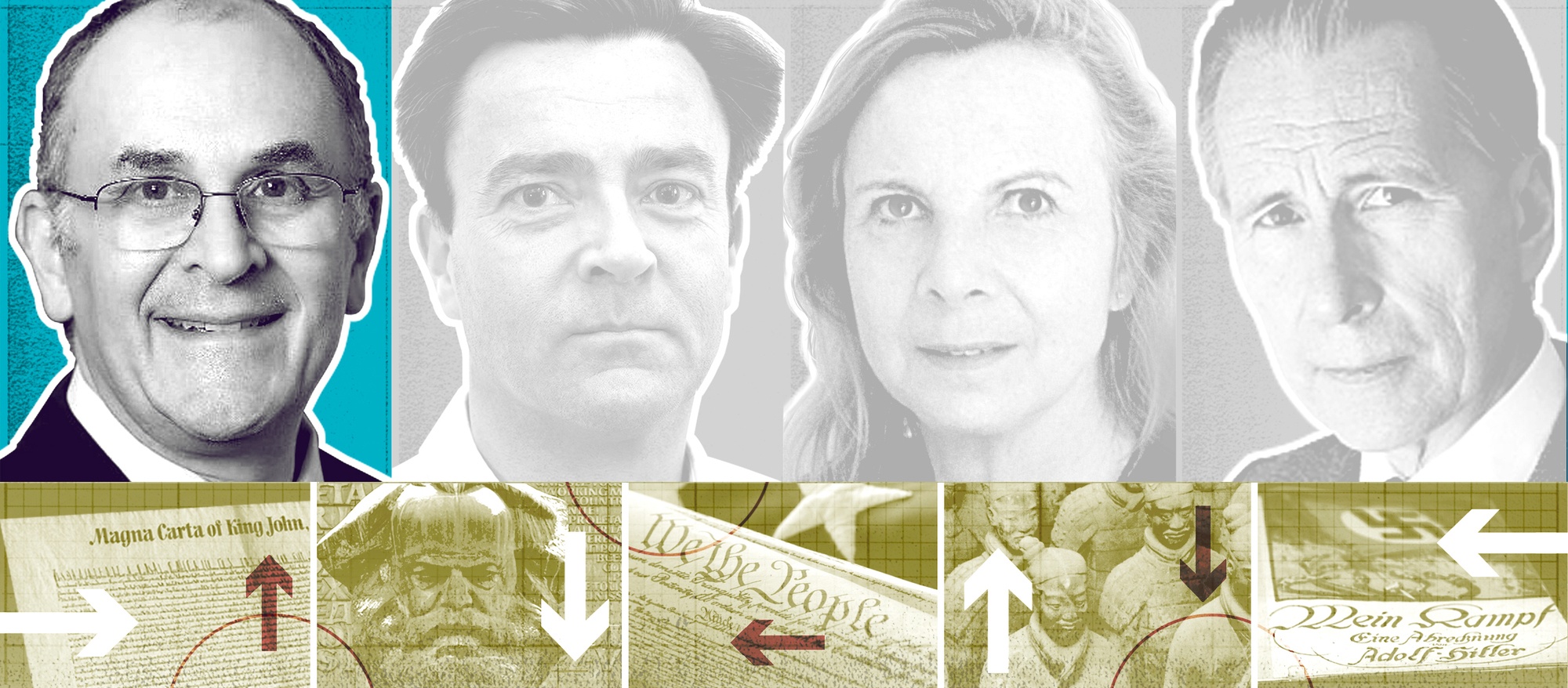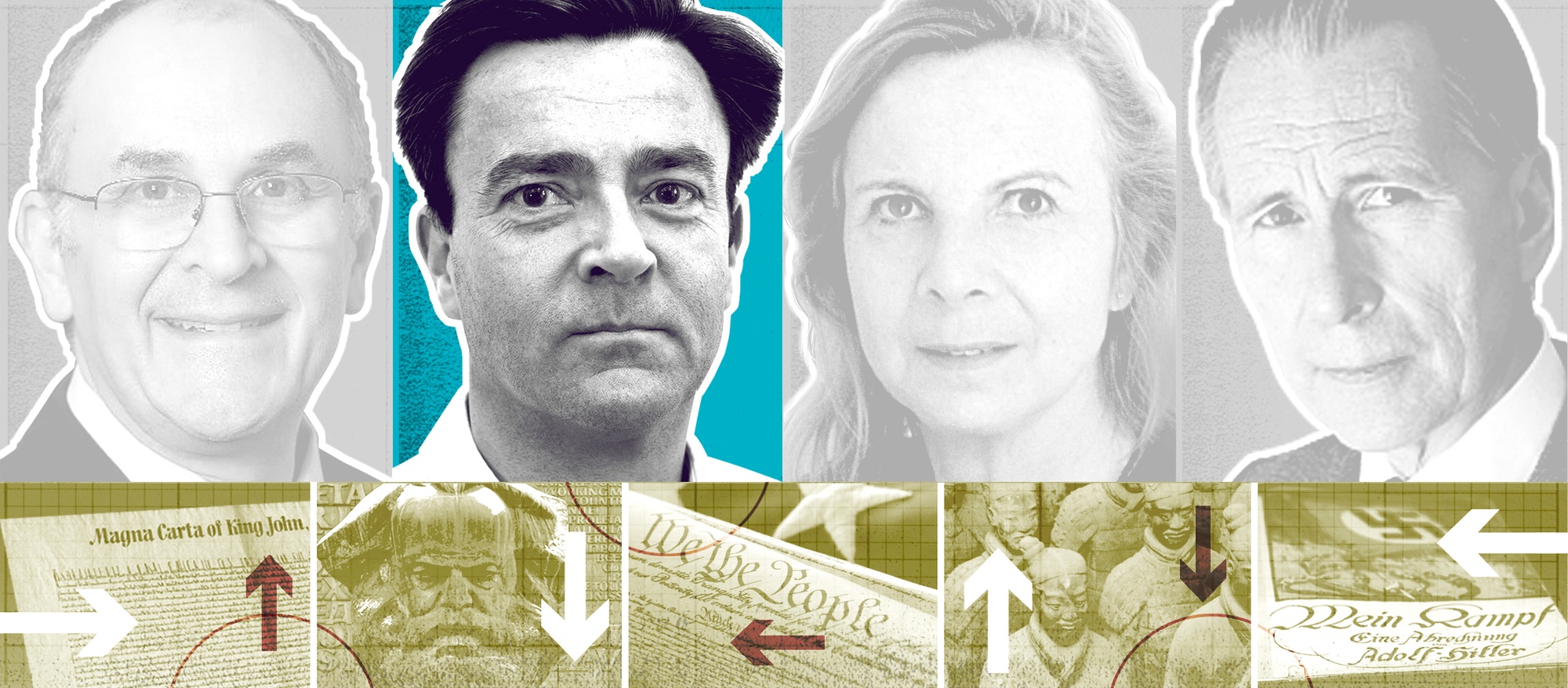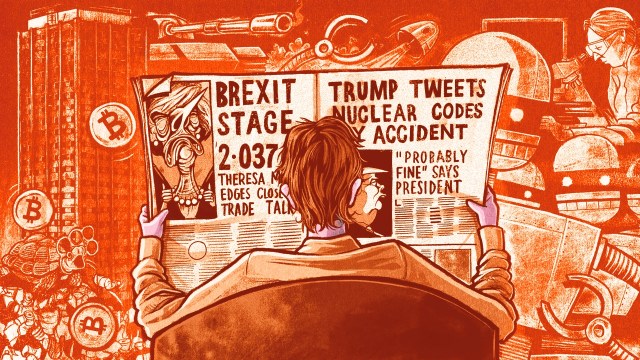Illustration by Ben Jennings – washed through in red.
Yesterday, our new History Jury met to discuss the event from 2017 that would NOT prove particularly consequential in the long-term – even if it might have appeared very important to us over the last twelve months. Our four historian panel did not reach a unanimous verdict but splitting fourways, they nominated Trump’s move of the US Embassy to Jerusalem; Brexit; the ousting of Mugabe; and concerns about North Korea getting nukes.
Today they offer their view of the event from 2017 with longer-term greater-than-anticipated consequence…

ELIOT COHEN: NORMALISATION OF TRUMP BY THE REPUBLICAN PARTY
Not an event, but a series of sounds: the creaking of bending knees among conservative (or nominally conservative) American intellectuals, pundits, and politicians making the case that Trump was not all that bad, when you come down to it…
A vulgarian and a loudmouth, perhaps, but look at the tax cuts!
The dismantling of irksome regulations!
The willingness to call out deadbeat European powers on their feeble defense spending!
And one might not like the way he did it, but he did point to real problems at home, to include unchecked immigration and outmoded infrastructure.
This matters because it indicates the way in which Trumpism, in some form, will survive Trump whether he serves three more years or seven, or is taken off by impeachment, a 25th Amendment process for removal by the Cabinet, or suffers the effect of too many snack buckets from KFC and Macdonald’s. This in turn means the loss of an intellectual centre for a Republican Party that once stood for some basic ideas, and opens up the prospect of conflict and renewal, in the realms of both ideas and action.
A collapse of character rarely is rarely a singular event but in a year in which Trump showed absolutely no alteration in his fundamental character, the fact that so many Republicans in and out of government were willing to accommodate themselves to him, was noteworthy. Luckily, the story will not end there.

PAUL LAY: CHINA IN AFRICA
If democracy is difficult, slow and neglectful of the long term, dictatorship has its challenges, too, though short-termism is rarely one of them. While historians and theologians argue over the introduction of a new project at Oxford University looking at the ethics of imperialism, the People’s Republic of China gets on with the real thing, especially in Africa, a continent of immense potential, mineral wealth, corrupt governance and poor infrastructure.
January 2017 saw a major event: the opening of a $4.2 billion railway line between Djibouti and Addis Ababa, replacing a 19th-century French railway. It’s the East African section of China’s trillion dollar One Belt Road – a 21st-century Silk Road, crossing and connecting huge swathes of the developing world – which will eventually reach Rwanda (where it will replace Britain’s 19th-century ‘Lunatic Line’). The potential for trade is enormous, but increasingly there is a cultural aspect, too. This new Scramble for Africa is, by and large, welcomed by states that have found western aid too prescriptive in its demands.
China now has more diplomatic missions in Africa than the US and has a greater number of peacekeepers on the continent than any of the UN’s Big Five. A hard power is finally cultivating its soft skills, as it continues its global ascent.

VICTORIA SCHOFIELD: ‘RUSSIA-GATE’
The appointment in May 2017 of former FBI Director, Robert Mueller, as special counsel to the Justice Department enquiry into alleged collusion between the Trump campaign and Russia during the 2016 American Presidential election initially appeared to be an attempt to let the enquiry take its course away from the media spotlight. The circumstances were similar to the appointment in 1973 of former Solicitor General, Archibald Cox, as special counsel to investigate the Watergate Hotel break-in.
But several indictments against Trump campaign advisers and members of his transition team have since indicated that Mueller’s probe is close to penetrating the Trump administration itself. Indicative of how seriously Mueller’s investigation is now being taken was the unprecedented revelation in December by the White House (and confirmed by Vladimir Putin) that the US administration had shared intelligence with the Russians, thereby preventing a planned terrorist attack in St Petersburg.
In the event that the investigation implicates the White House leading to calls for Trump’s impeachment, a plausible explanation might then be mounted, suggesting that any contact with Russian agents was part of the new administration’s policy initiatives for greater intelligence sharing in the war against terrorism, rather than being a covert attempt to enlist the help of a foreign country to thwart the outcome of the Presidential election.
The parallels with the early stages of Watergate are unmistakable. The sequel could be as historic.

ALLAN MALLINSON: PRESIDENT MACRON
The election of President Macron – but in a perverse sense. His international profile is high, but largely by default. Mrs Merkel is distracted by Germany’s internal divisions; Mrs May by Brexit; and President Trump by himself. Some are saying therefore that Macron will become the de facto leader of the free world. There are several problems with such a leadership bid.
- First, reputation counts; and France has no record of leadership worth the name.
- Secondly, although young and telegenic in a country that rates these things, and although he has had one or two technocratic successes since being elected (especially trades union reform), he is not tackling “L´éléphant dans la chambre”: the question of national identity and Islamism. François Heisbourg, former presidential adviser on national security issues to both Nicolas Sarkozy and François Hollande, has said recently “This is one where people are asking the question, ‘When is he going to speak?’ He will not be able to keep silent forever. It’s one of the deepest divisions in the public debate that I’ve seen in a very long time, and it’s very ugly.”
It wasn’t ugly enough for Marine Le Pen to be elected, but it certainly is for Sarkozy to make a comeback. Sarkozy back at the Elysée, chastened but experienced, and doubly determined, would mean the ditching of Euro-defence pretensions, a strengthening of Nato, and root and branch reform of the EU.
Perhaps more a prayer than a prediction, but a fervent one nevertheless.
***
UnHerd also has our Politics Jury (reconvening for a second set of deliberations soon!).










Join the discussion
Join like minded readers that support our journalism by becoming a paid subscriber
To join the discussion in the comments, become a paid subscriber.
Join like minded readers that support our journalism, read unlimited articles and enjoy other subscriber-only benefits.
Subscribe